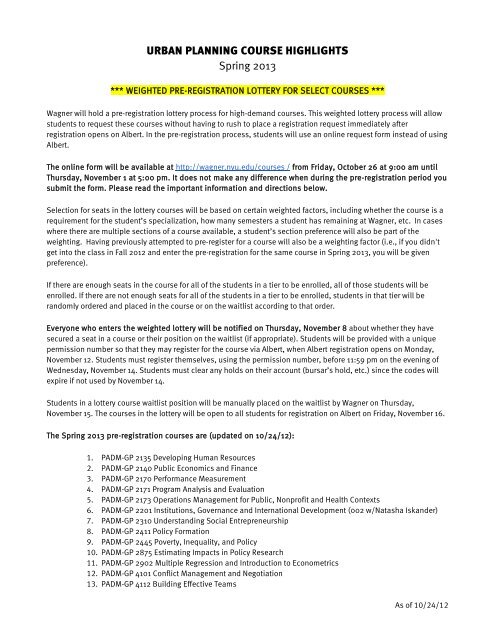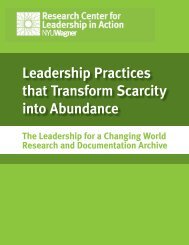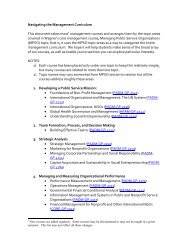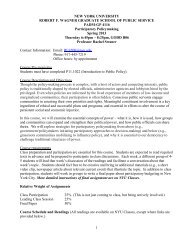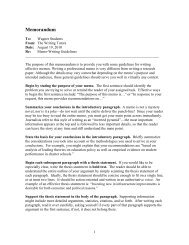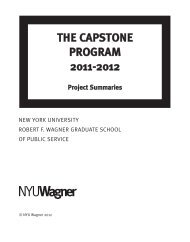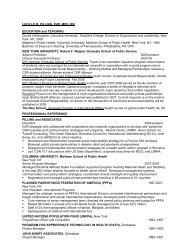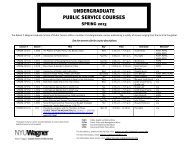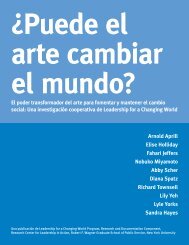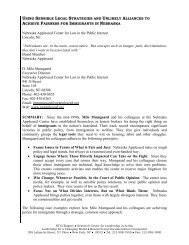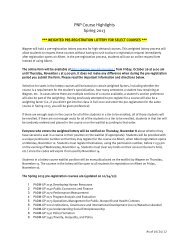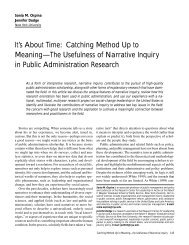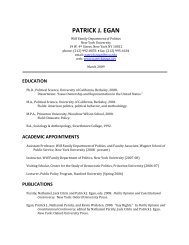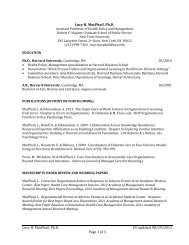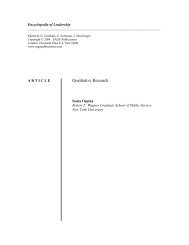Spring 2013 Course Highlights Template.docx - NYU Wagner
Spring 2013 Course Highlights Template.docx - NYU Wagner
Spring 2013 Course Highlights Template.docx - NYU Wagner
You also want an ePaper? Increase the reach of your titles
YUMPU automatically turns print PDFs into web optimized ePapers that Google loves.
URBAN PLANNING COURSE HIGHLIGHTS<br />
<strong>Spring</strong> <strong>2013</strong><br />
*** WEIGHTED PRE-REGISTRATION LOTTERY FOR SELECT COURSES ***<br />
<strong>Wagner</strong> will hold a pre-registration lottery process for high-demand courses. This weighted lottery process will allow<br />
students to request these courses without having to rush to place a registration request immediately after<br />
registration opens on Albert. In the pre-registration process, students will use an online request form instead of using<br />
Albert.<br />
The online form will be available at http://wagner.nyu.edu/courses / from Friday, October 26 at 9:00 am until<br />
Thursday, November 1 at 5:00 pm. It does not make any difference when during the pre-registration period you<br />
submit the form. Please read the important information and directions below.<br />
Selection for seats in the lottery courses will be based on certain weighted factors, including whether the course is a<br />
requirement for the student’s specialization, how many semesters a student has remaining at <strong>Wagner</strong>, etc. In cases<br />
where there are multiple sections of a course available, a student’s section preference will also be part of the<br />
weighting. Having previously attempted to pre-register for a course will also be a weighting factor (i.e., if you didn't<br />
get into the class in Fall 2012 and enter the pre-registration for the same course in <strong>Spring</strong> <strong>2013</strong>, you will be given<br />
preference).<br />
If there are enough seats in the course for all of the students in a tier to be enrolled, all of those students will be<br />
enrolled. If there are not enough seats for all of the students in a tier to be enrolled, students in that tier will be<br />
randomly ordered and placed in the course or on the waitlist according to that order.<br />
Everyone who enters the weighted lottery will be notified on Thursday, November 8 about whether they have<br />
secured a seat in a course or their position on the waitlist (if appropriate). Students will be provided with a unique<br />
permission number so that they may register for the course via Albert, when Albert registration opens on Monday,<br />
November 12. Students must register themselves, using the permission number, before 11:59 pm on the evening of<br />
Wednesday, November 14. Students must clear any holds on their account (bursar’s hold, etc.) since the codes will<br />
expire if not used by November 14.<br />
Students in a lottery course waitlist position will be manually placed on the waitlist by <strong>Wagner</strong> on Thursday,<br />
November 15. The courses in the lottery will be open to all students for registration on Albert on Friday, November 16.<br />
The <strong>Spring</strong> <strong>2013</strong> pre-registration courses are (updated on 10/24/12):<br />
1. PADM-GP 2135 Developing Human Resources<br />
2. PADM-GP 2140 Public Economics and Finance<br />
3. PADM-GP 2170 Performance Measurement<br />
4. PADM-GP 2171 Program Analysis and Evaluation<br />
5. PADM-GP 2173 Operations Management for Public, Nonprofit and Health Contexts<br />
6. PADM-GP 2201 Institutions, Governance and International Development (002 w/Natasha Iskander)<br />
7. PADM-GP 2310 Understanding Social Entrepreneurship<br />
8. PADM-GP 2411 Policy Formation<br />
9. PADM-GP 2445 Poverty, Inequality, and Policy<br />
10. PADM-GP 2875 Estimating Impacts in Policy Research<br />
11. PADM-GP 2902 Multiple Regression and Introduction to Econometrics<br />
12. PADM-GP 4101 Conflict Management and Negotiation<br />
13. PADM-GP 4112 Building Effective Teams<br />
As of 10/24/12
14. PADM-GP 4340 Digital Innovation Lab<br />
15. URPL-GP 2608 Urban Economics<br />
Weighted Pre-Registration Lottery Timeline: Quick View<br />
Friday, October 26 9:00 am Pre-registration Lottery Form is live at<br />
http://wagner.nyu.edu/courses/<br />
Thursday, November 1 5:00 pm Pre-registration Lottery Form closes<br />
Thursday, November 8 5:00 pm Students notified of Lottery request results- whether they have<br />
secured a seat in a course (and issued a permission code) or their<br />
position on the waitlist (on which they will be manually placed by<br />
Academic Services)<br />
Monday, November 12 9:00 am Students begin to register themselves on Albert using permission<br />
codes (if not on waitlist)<br />
Wednesday, November 14 11:59 pm Deadline for students to use permission codes<br />
Thursday, November 15 5:00 pm Students placed on Lottery course waitlists by Academic Services<br />
Friday, November 16 10:00 am Lottery courses are open to all students for registration on Albert<br />
Reminder: Students must clear any holds on their account (bursar’s hold, etc.) since the course registration<br />
permission codes for the lottery will expire if not used before Wednesday, November 14. The lottery process will not<br />
take into account any schedule conflicts. If you secure a seat in conflicting courses, you must choose which course to<br />
take and which to forego.<br />
If after reading through the instructions you have remaining questions, email wagner.academicservices@nyu.edu.<br />
*** IMPORTANT GENERAL REGISTRATION NOTES ***<br />
Check Albert for Updated <strong>Course</strong> Meeting Dates, Times and <strong>Course</strong> Changes<br />
The course schedule is posted on <strong>Wagner</strong> website but it is important to always check Albert for the most updated<br />
information on courses. Albert may be updated daily, while the course schedules on the <strong>Wagner</strong> website are updated<br />
once per week.<br />
January Intersession courses included in <strong>Spring</strong> <strong>2013</strong> schedule<br />
<strong>Course</strong>s offered in January <strong>2013</strong> are included and in the <strong>Spring</strong> <strong>2013</strong> schedule on the <strong>Wagner</strong> website (search for<br />
“January”), and as part of <strong>Spring</strong> <strong>2013</strong> on ALBERT.<br />
Skills <strong>Course</strong>s<br />
Most skills courses are 2-credit courses (4000-level courses).<br />
Outside/University-wide Electives<br />
To view the University-wide list of courses that has been pre-approved by the <strong>Wagner</strong> faculty and may be taken as<br />
electives, visit http://wagner.nyu.edu/courses/otherlistings.php. This is a helpful tool that allows you to see non-<br />
<strong>Wagner</strong> courses listed by topic area, for example international development, social policy, education policy,<br />
As of 10/24/12
nonprofit management, and more. We have made every effort to update non-<strong>Wagner</strong> course numbers, but you may<br />
need to consult with the department to verify new course numbers. For instructions on how to register for non-<strong>Wagner</strong><br />
courses, see: http://wagner.nyu.edu/students/registration/outside<strong>Wagner</strong>.php.<br />
Pre-Term Workshops<br />
Pre-Term Workshops are open to all current students. Registration is completed through Albert. For more information<br />
on Pre-Term, consult the website: http://wagner.nyu.edu/current/services/preterm.php<br />
<strong>Course</strong>s by Semester<br />
To view an outline of when courses are typically offered, visit http://wagner.nyu.edu/courses/ and download the<br />
“<strong>Course</strong>s by Semester” documents for each program.<br />
Composing Your Career<br />
Dates and times for these workshops can be found in Albert and on the spring course schedule,<br />
http://wagner.nyu.edu/courses/. Students must submit pre-registration requests for the non-credit “Composing Your<br />
Career” workshops.<br />
Core <strong>Course</strong> Waiver Exams<br />
Students who do not qualify for an automatic course waiver (see waiver policies at:<br />
http://www.nyu.edu/wagner/current/registration/waivers.php) may write a waiver exam. The waiver schedule for<br />
May is posted on our website, and students can register online (at the link above). Waivers must be completed prior<br />
to the start of a student’s second semester.<br />
SPSS Proficiency Exam<br />
SPSS proficiency is a requirement for graduation. Students who waive Statistics (CORE-GP 1011) must demonstrate<br />
proficiency in SPSS by passing the SPSS examination (NONCR-GP 938) prior to starting Capstone or by completing<br />
PADM-GP 2902 Multiple Regression and Introduction to Econometrics. Register on Albert for the optional preparatory<br />
module (NONCR-GP 931) for the SPSS exam and for the exam (NONCR-GP 938). Students who take CORE-GP 1011 gain<br />
proficiency through their coursework.<br />
Labs/Recitations for Quantitative <strong>Course</strong>s<br />
Please note that the labs/recitations for the following courses are mandatory, but have been given separate course<br />
numbers:<br />
Statisitcs lecture: CORE-GP 1011; laboratory: CORE-GP 111<br />
Microeconomics lecture: CORE-GP 1018; recitation: CORE-GP 118<br />
Financial Management lecture: CORE-GP 1021; recitation: CORE-GP 121<br />
Multiple Regression lecture: PADM-GP 2902; recitation: PADM-GP 290<br />
You must register the corresponding non-credit lab/recitation when you register for a lecture.<br />
Please note that PADM-GP 2140 Public Economics and Finance has an optional recitation section (PADM-GP 140). It<br />
is not mandatory to register for this discussion when you register for the lecture, although it is highly recommended.<br />
As of 10/24/12
*** SPRING <strong>2013</strong> COURSE INFORMATION ***<br />
(In addition to the courses on the following pages, there are course announcements listed on the Health,<br />
International, PNP course highlight documents found here http://wagner.nyu.edu/courses/)<br />
~ new courses offered in January intersession (listed on spring schedule) ~<br />
PADM-GP 4132 Governance of Public/Private Finance: Policy, Law & Business (2 credits)<br />
Instructor: Richard Brodsky<br />
Day/Time: Tuesday/Thursday 6:00 pm - 9:00 pm<br />
Dates: 1/08/<strong>2013</strong> - 1/24/<strong>2013</strong><br />
Prerequisite: CORE-GP 1020<br />
Recently, traditional methods of capital flow between the private and public sector have undergone tremendous<br />
change. For many years the financial and social needs of both sectors were adequately addressed by traditional debt<br />
instruments, largely bonds and notes. Starting some years ago, there began a proliferation of new entities that now<br />
account for the bulk of public indebtedness. These have sprung up without serious examination of the reasons for<br />
their creation, their governance, their policies and practices, and their consequences. This course will examine all<br />
forms of these new structures, the law and reality of their operation, international, national and state efforts to<br />
monitor and control them, and their impacts on financial markets and government policies. The course will look at<br />
efforts by the IMF to rationalize and regulate Public/Private groups and by New York State to rationalize and<br />
democratize their governance, the application of fiduciary obligation to their operations, unintended legal and<br />
financial problems, and the unresolved financial, ethical, legal, policy and political questions that remain. Cases to<br />
be studied include the financing of the new Yankee Stadium, the TARP Fund, PATH, and the Norwegian Sovereign<br />
Wealth Fund. The course will include required readings, notable guest speakers from both public and private sectors,<br />
team case studies, and a final paper.<br />
PADM-GP 4340 Digital Innovation Lab (2 credits)<br />
Instructor: Yasmin Fodil (see bio below)<br />
Day/Time: Wednesday/Friday 2:00 pm - 6:00 pm<br />
Dates: 1/7/<strong>2013</strong> – 1/25/<strong>2013</strong><br />
Prerequisites: None<br />
Advances in the capabilities of digital technology to organize, create, and share information combined with the<br />
pervasiveness of personal technology devices has transformed our society in innumerable ways. Technology has also<br />
changed the way that institutions interact with and serve their constituents as evidenced through a number of<br />
interesting innovations in the field. The course will delve into several of these programs, such as: Code for America,<br />
which brings develops, designers and entrepreneurs into city government to help the offices become more open and<br />
efficient; TurboVote, a tool that is trying to make voting as easy as possible by using the web to streamline the<br />
absentee voter registration process; the Transportation Security Administration (TSA) Blog which enables a dialogue<br />
with the public about their methods and guidelines, potentially improving the relationship between travelers and the<br />
agency; among others. This is a practical course that will help you gain the practical skills necessary to develop and<br />
refine a socially conscious digital innovation concept and bring it to fruition.<br />
Instructor Bio:<br />
Yasmin Fodil is the co-founder and director of BYO consulting, where she specializes in creative public policy making<br />
and how technology can be used to make government and organizations more collaborative, participatory,<br />
transparent, and accountable. She has worked at NASA's Goddard Space Flight Center on an internal<br />
communications plan for their engineering directorate and as an Information Officer for the Office of the Arts and<br />
Special Projects at the NYC Department of Education.She regularly blogs at wethegoverati.wordpress.com. Fodil has a<br />
As of 10/24/12
Masters of Public Policy from the Harvard Kennedy School of Government and a Bachelors in Government from<br />
Cornell.<br />
~ new courses offered in spring semester ~<br />
URPL-GP 4629 – Transportation at the Technology Frontier (2 credits)<br />
Instructor: Sarah Kaufman<br />
Day/Time: Tuesdays, 6:45 pm – 8:25pm (meets in the first seven weeks of the semester)<br />
Prerequisite: None<br />
The course will explore the major categories and characteristics relating to technology in mobility networks,<br />
relationships within and to them, and concepts surrounding them through both seminar classes and field research.<br />
As planners, technologists and policymakers pursue the “internet of things” in infrastructure, future transportation<br />
developments will need to address emerging technologies and the networks that connect them.<br />
Transportation networks to be discussed in this course include the physical (rail, road); spatial (connected<br />
neighborhoods/nodes); information (data, communications); linguistic (local jargon); external (connectivity to<br />
adjacent networks); sociological (multi-demographic strangers); supportive (back-end infrastructure); and<br />
experiential (the story as output). Among these networks are the relationships that enable them: Machine-tomachine<br />
(train to rail, car to car), human to machine (rider to train); and human to human (fleeting interactions), as<br />
enabled, or exacerbated, using new technologies. Students will consider how transportation networks are affected by<br />
the tools, policies and resources surrounding technology’s incorporation.<br />
URPL-GP 4237 – Urbanization in Developing Countries (2 credits)<br />
Instructors: Solly Angel<br />
Day/Time: Thursdays, 8:35 pm - 10:15 pm (meets in the first seven weeks of the semester)<br />
Prerequisite: PADM-GP 2201<br />
The course focuses on understanding and coming to terms with the current prospects of global urban expansion. The<br />
first part of the course will focus on four propositions underlying a new paradigm for managing the rapid urbanization<br />
that can now be observed in developing countries: the inevitable expansion proposition, the sustainable densities<br />
proposition, the decent housing proposition, and the public works proposition. The second part of the course will<br />
focus on urbanization in a new historical perspective, on the geography of world urbanization, and on the global<br />
hierarchy of cities. The third part of the course will explore the theory and the empirical evidence concerning global<br />
urban expansion by focusing on seven topics: global urban land cover and its expansion; the persistent decline in<br />
urban densities; from centrality to dispersal; the fragmentation of urban landscapes; the pulsating compactness of<br />
urban footprints; urban and cover projections 2000-2050; and urban expansion and the loss of cultivated land.<br />
PADM-GP 2425 – Government 3.0: Rethinking Governance for the 21st Century (4 credits)<br />
Instructor: Beth Noveck<br />
Day/Time: Wednesdays, 4:55 pm - 6:35 pm<br />
Prerequisite: CORE-GP 1020<br />
We live in an era of unprecedented technological innovation with ingenious new advances for achieving clean energy,<br />
eradicating disease and providing greater wellness, more equitably and effectively delivering education, and<br />
improving the quality of human existence and expression. At the same time, we are experiencing clear deficits within<br />
centralized institutions of government and civil society: deficits of agility, innovation and capacity. These traditional<br />
institutions are failing to tap into the diversity of expertise and experience of individuals and communities, rendering<br />
us less able to quickly discover, recognize, implement and scale innovative approaches to pressing problems and<br />
making it impossible to translate technological innovation into social progress. New technology makes collaborative<br />
problem solving possible. In this course, we explore how we might use technology -- from big data to social media --<br />
to redesign our systems of governance to devolve power from centralized, hierarchical institutions and evolve more<br />
robust collaboration among individuals, groups and institutions including government and the media. Through<br />
customized reading lists, blogging assignments, and a final design project participants will apply what we learn<br />
about innovation to the issues about which they are the most passionate.<br />
As of 10/24/12
PADM-GP 4143 – Research Tools and Methods for Public Service (2 credits)<br />
Instructors: Shankar Prasad and Judy Polyne<br />
Day/Time: Wednesdays, 4:55 pm - 6:35 pm (meets in the second seven weeks of the semester)<br />
Prerequisite: CORE-GP 1011<br />
Quantitative and qualitative methods are essential for effective policymaking. In addition to helping us identify social<br />
problems, we can use research to help determine causes of these problems, suggest potential solutions and<br />
evaluate effectiveness of existing programs. Most policy-relevant research questions can be addressed in many<br />
different ways, each with its own strengths and weaknesses. In this course, students will learn the formal principles<br />
of research design as they apply to both qualitative and quantitative methods. Students will also learn about the<br />
comparative advantages and disadvantages of different data collection methods. The primary goal of this course is to<br />
learn how to identify and evaluate alternative research designs and data collection strategies. These conceptual tools<br />
will help students become more sophisticated consumers and producers of research. A secondary goal is to provide<br />
a hands-on introduction to observing phenomena, conducting interviews, running focus groups and writing effective<br />
surveys.<br />
PADM-GP 4619 – Arts, the Artist, and Public Art in Urban Revitalization (2 credits)<br />
Instructor: Tim Tompkins and Sherry Dobbin (see bio below)<br />
Day/Time: Tuesdays, 6:45 pm - 8:25 pm (meets in the first seven weeks of the semester)<br />
Prerequisite: CORE-GP 1022<br />
This seven-week course addresses the role of arts institutions, artists and public art in revitalizing cities, with an<br />
emphasis on comparative domestic and international examples of distinctive interventions and the larger lessons<br />
that can be drawn from them. We examine how the economic, geographic and social context shapes both art and its<br />
role with respect to public policy goals. Students will refine their ability to analyze existing projects and programs<br />
and plan creative interventions as tools for revitalizing cities. In the process, we will also examine and broaden the<br />
definition of public art. The class is appropriate for those interested in both public policy, planning and<br />
administration as well as arts-based practice and theory.<br />
Instructor Bio:<br />
Sherry Dobbin, Director of Public Art for Times Square Arts, the public art program of the Times Square Alliance. She<br />
brings over 20 years international experience across performance and visual arts, and art in the public realm, where<br />
she has worked as producer, administrator, consultant and curator. Prior to Times Square, she was the Director of<br />
Robert Wilson's The Watermill Center and a Project Director of arts-led regeneration throughout London and Eastern<br />
UK. She is a Fellow of the Royal Society of Arts (UK), and holds a Masters with Distinction from University of London,<br />
Birkbeck College in Cross-disciplinary Arts History and a BFA in Theater Studies from Boston University College of Fine<br />
Arts.<br />
~ application-only courses in spring <strong>2013</strong> ~<br />
(these courses are not in the weighted pre-registration lottery)<br />
PADM-GP 2129 – Race, Identity and Diversity in Organizations (4 credits)<br />
Instructor: Erica Foldy<br />
Day/Time: Wednesdays, 6:45 pm - 8:25 pm<br />
Prerequisites: CORE-GP 1020<br />
Note: This is an application-only course separate from <strong>Wagner</strong>’s Weighted Pre-Registration Lottery. In order to<br />
request registration, please fill out the form here. Applications should be no more than about a page. Applications<br />
will be accepted from now until Monday, October 29th. Students will be notified about registration results on<br />
November 8th. If you have questions, please contact Ann Lin at ann.lin@nyu.edu.<br />
As of 10/24/12
This course brings together a wide range of thinking and scholarship about race and identity to encourage learning<br />
about what race is, why it matters, and racial dynamics in organizations. While recognizing the importance of<br />
intersectionality and other markers of difference such as gender and class, the course focuses on race for two<br />
reasons: 1) it is generally the most charged dimension of diversity in the United States, the most difficult to discuss<br />
and, therefore, the topic we most often avoid, and 2) it has the greatest impact on life chances and opportunities:<br />
race is often the best predictor of income, wealth, education, health, employment and other important measures of<br />
well-being. The course will roughly divide into two parts. The first part will address the phenomenon of race more<br />
broadly, while the second half will look more closely at organizations, especially public service contexts such as<br />
social services, health care and philanthropy.<br />
URPL-GP 2616 – Colloquium on the Law, Politics, and Economics of Urban Affairs (4 credits)<br />
Instructor: Ingrid Gould Ellen<br />
Day/Time: Wednesdays, 2:00 pm - 3:50 pm<br />
Prerequisites: CORE-GP 1011 and either PADM-GP 2140 or URPL-GP 2608<br />
Note: This is an application-only course separate from <strong>Wagner</strong>’s Weighted Pre-Registration Lottery. In order to<br />
request registration, please fill out the form here. Applications should be no more than about one page. Submissions<br />
will be accepted from now until Monday, October 29th. Students will be notified about registration results on<br />
November 8th. If you have questions, please contact Joanne Williams at joanne.williams@nyu.edu.<br />
This course, taught jointly by faculty at <strong>NYU</strong> Law and <strong>Wagner</strong>, offers students an opportunity to explore the theoretical<br />
underpinnings of the leading current debates about such critical urban policy issues as whether and how to contain<br />
suburban sprawl; the impacts of various efforts to increase the production of affordable housing; and the successes<br />
and failures of efforts to improve and equalize the quality of education. The primary focus of the colloquium are<br />
discussions of works in progress by scholars from around the country, working in such disciplines as planning, law,<br />
public policy, and economics. In colloquium weeks, students participate in an in-depth discussion of the paper with<br />
the author. Students submit a short paper critiquing the work in progress. In alternate weeks, students meet with<br />
faculty to discuss supplemental readings and learn the background necessary to understand each paper.<br />
~ course moved from summer to spring <strong>2013</strong> ~<br />
PADM-GP 4250 – Hunger and Food Security in a Global Perspective (2 credits)<br />
Instructor: John Gershman<br />
Day/Time: Mondays, 4:55 pm - 6:35 pm (meets in the second seven weeks of the semester)<br />
Prerequisite: CORE-GP 1018, CORE-GP 1011, and CORE-GP 1022<br />
Note: This 2-credit course meets in New York only (see PADM-GP 2250 for Ghana-based version, which meets in<br />
summer).<br />
This course explores the political and economic policy issues surrounding hunger and food security, drawing on<br />
many case examples and using Ghana as a case study. The course will provide an overview of some of the core<br />
dimensions of global hunger and food security policy issues, including debates over a new green revolution, food<br />
aid, fair trade, the impact of expanded biofuels production and the impact of the inter-related financial, food, and<br />
fuel crises.<br />
~ courses taught in an intensive format spring <strong>2013</strong> ~<br />
PADM-GP 2204 Development Assistance, Accountability, and Aid Effectiveness<br />
(4 credits)<br />
As of 10/24/12
Instructor: Paul Smoke and John Gershman<br />
Day/Time: Fridays 9:00 am – 3:00 pm<br />
Dates: 2/08/<strong>2013</strong>, 2/22/<strong>2013</strong>, 3/15/<strong>2013</strong>, 4/05/<strong>2013</strong><br />
Prerequisite: CORE-GP 1018, CORE-GP 1022<br />
PADM-GP 2245 Financing Local Government in Developing Countries<br />
(4 credits)<br />
Instructor: Paul Smoke<br />
Day/Time: Fridays 10:00 am – 2:00 pm<br />
Dates: 2/01/<strong>2013</strong>, 2/15/<strong>2013</strong>, 3/01/<strong>2013</strong>, 3/08/<strong>2013</strong>, 4/12/<strong>2013</strong><br />
Prerequisite: CORE-GP 1018, PADM-GP 2201<br />
~ courses not offered in spring <strong>2013</strong> ~<br />
PADM-GP 2236 – Protecting Rights and Promoting Development: Labor and Environmental Standards in the<br />
Global Economy<br />
Instructor: Salo Coslovsky<br />
Not offered again until 2014<br />
URPL-GP 2666 – Water Sourcing and Climate Change<br />
Instructor: Natasha Iskander<br />
Not offered again until 2014<br />
For course descriptions (see “course listings”), course syllabi, course schedules, courses-bysemester,<br />
and program checksheets, go to: http://wagner.nyu.edu/courses/<br />
As of 10/24/12
SPRING <strong>2013</strong><br />
9:00am-<br />
10:40am<br />
10:00am-<br />
11:40am<br />
2:00pm-<br />
3:40pm<br />
4:55pm-<br />
6:35pm<br />
6:45pm-<br />
8:25pm<br />
8:35pm-<br />
10:15pm<br />
Monday Tuesday Wednesday Thursday Friday<br />
Land Use Law:<br />
The Planning<br />
Perspective<br />
(URPL-GP 1605-<br />
002)<br />
Urban Economics<br />
(URPL-GP 2608-002)<br />
Urban Planning:<br />
Practices and<br />
Methods<br />
(URPL-GP 1603-001)<br />
Planning for<br />
Emergencies and<br />
Disasters<br />
(URPL-GP 2645)<br />
Urban Economics<br />
(URPL-GP 2608-001)<br />
Transportation at the<br />
Technology Frontier<br />
(URPL-GP 4629)*<br />
Urban Planning:<br />
Practices and<br />
Methods<br />
(URPL-GP 1603-002)<br />
Colloquium on the Law, Politics,<br />
and Economics of Urban Affairs<br />
(URPL-GP 2616)<br />
Meets 2:00pm-3:50pm<br />
Land Use Law: The Planning<br />
Perspective<br />
(URPL-GP 1605-001)<br />
Housing and Community<br />
Development Policy<br />
(URPL- GP 4638)*<br />
Environmental Impact<br />
Assessment<br />
(URPL-GP 2610)<br />
Building Green Housing<br />
(URPL-GP 4639)**<br />
Urban Planning:<br />
Practices and Methods<br />
(Lab)<br />
(URPL-GP 1603-003)<br />
Transportation Policy<br />
(URPL-GP 2470)<br />
Special Topics in<br />
Housing: Informal<br />
Settlements<br />
(URPL-GP 4636)*<br />
Selected Topics in<br />
Community Equity and<br />
Wealth Building<br />
(URPL-GP 4635)**<br />
Urban Planning:<br />
Practices and Methods<br />
(Lab)<br />
(URPL-GP 1603-004)<br />
* Indicates class meets Weeks 1-7 of semester; ** Indicates class meets Weeks 8-14 of semester<br />
+ Indicates irregular meeting pattern: see Albert for details<br />
Development Assistance,<br />
Accountability, and Aid<br />
Effectiveness<br />
(PADM-GP 2204)+<br />
Meets 9:00am-3:00pm<br />
Financing Local<br />
Government in Developing<br />
Countries<br />
(PADM-GP 2245)+<br />
Meets 10:00am-2:00pm<br />
Advanced Geographical<br />
Information Systems<br />
(URPL-GP 2690)**<br />
Meets 2:00pm-5:00pm


